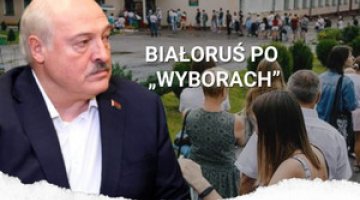Belarus: a wave of social discontent before presidential elections
Since 21 May, the electoral committees for candidates in the presidential elections scheduled for 9 August have been collecting the signatures necessary to register formally. In Minsk, as well as in most large and medium-sized Belarusian cities, these actions have attracted hundreds or even thousands of citizens who want to support alternative candidates to President Alyaksandr Lukashenka, who has been in office for 26 years. So far, the largest meetings took place on 30-31 May, attracting a total of about 20,000 people. The public mobilisation was strengthened by the arrest in Grodno on 29 May of the popular blogger and social activist Siarhiey Tsikhanouskiy while he was holding a pre-election rally. Earlier that day, Lukashenka, who is running for re-election for the fifth time, harshly criticised what he sees as the harmful political activity of the “lousy” blogger, suggesting at the same time that he is being supported by the Russian authorities. The Belarusian president also rated the other candidates negatively, including the former director of Belgazprombank Viktar Babaryka, and the founder of the High Technology Park in Minsk, Valery Tsapkala. Above all, Lukashenka focused on questioning their honesty, and in the case of Babaryka, also suggested that he was a “Russian candidate”. Further repression against the government’s opponents took place on 31 May, when about 30 people were detained during opposition pickets; these included Mikola Statkievich, a candidate in the 2010 presidential elections and a former political prisoner who currently supports Tsikhanouskiy. On 1 June, during an extraordinary meeting with General Valery Vakulchik, the head of the State Security Committee (KGB), President Lukashenka stated that he would not allow “any kind of Maidan”, and obliged the general to counteract any interference in the electoral process from outside.
Commentary
- The large-scale determination to sign up to support potential opponents to Lukashenka is unprecedented, indicating a significant increase in political activity among the Belarusian people. The activation of so many groups of citizens, representing different ages and professional groups, reflects the rise in dissatisfaction with the regime among the majority of Belarusian society. This has been caused by the government ignoring the threat of the COVID-19 epidemic, which has led to a huge number of infections (currently over 43,000), as well as the ineffective measures it took to protect people harmed by the deepening recession in the Belarusian economy (from January to April this year GDP fell by 1.3%). This means that the anti-government moods among the public are also driven by the feelings that neither their health nor their social security is secure. Social discontent has been rising since 2017, when there were nationwide protests against the so-called ‘tax on parasitism’, which affected people of working age who had been deprived of legal employment.
- The current campaign to collect signatures for letters of support (which will last until 19 June; each applicant must collect at least 100,000 signatures) has revealed the Belarusian public’s demand for any alternative to rule by Lukashenka. This state of affairs gives the impression that the majority of the signatories do not actually know anything about the manifestoes of the current candidates for the presidency. So far, the popular and charismatic 41-year-old blogger Siarhiey Tsikhanouskiy has aroused the most interest; he has criticised Lukashenka’s rule in a way accessible to all citizens, which to some extent imitates the anti-system rhetoric of the current president during his first campaign in 1994. Tsikhanouskiy’s followers have not been discouraged by the fact that the authorities have refused to register his campaign committee, as a result of which his wife Svetlana registered her own, or by the lack of a clear declaration as to whether she will in fact participate in the election. In his public statements, Tsikhanouskiy has claimed that participating in the campaign is pointless because of the non-transparent way in which the votes will be counted. This position corresponds to the scepticism which most citizens have about how fair elections in Belarus really are.
- More limited interest, albeit still higher than previous election campaigns, has been generated by the campaigns of the less charismatic candidates, primarily Viktar Babaryka and Valery Tsapkala. They both come from the nomenklatura and mainly appeal to the inhabitants of large cities. Both have also focused on the need for a comprehensive reconstruction of the state and the economy, with particular emphasis on market reforms, to be based largely on IT and the private sector. At the same time, they have avoided the harsh criticism and simple slogans used by the Tsikhanouskiy campaign (such as comparing Lukashenka to a ‘cockroach’). These new faces in Belarusian politics are much more popular and active in their campaigning than the representatives of the traditional opposition, which the public sees as being ineffective and internally divided.
- The regime’s most radical critics have been detained for several days; this is aimed above all at neutralising the increasingly popular Tsikhanouskiy, as well as Statkievich, who has been supporting him. The radical turn in the hitherto moderate rhetoric of Tsapkala and Babaryka may also lead to increased repression against these candidates, which would be a warning signal to the Belarusian nomenklatura. The resort to repressive measures at such an early stage in the presidential campaign also results from the lack of a positive narrative from the regime. In view of the low credibility of the increasingly anachronistic propaganda on state media, as well as the lack of any chances to improve the standard of living from the state budget, the only real way to marginalise the opposition (which has been repeatedly successful in the past) remains to increase repression and tighten control over society. The authorities assume that most of the public will not run the risk of participating in illegal demonstrations, and will limit their opposition to legally signing lists of support for their preferred candidates.
- The harsh criticism of some of the candidates which President Lukashenka made on 29 May is above all a reaction to the Belarusian people’s large-scale interest in the electoral campaigns being conducted by opponents of the regime. The extent of support for these candidates certainly came as a big surprise to the authorities, who had expected that fear of the COVID-19 epidemic would further reduce the public’s already low political activity. At the same time, everything indicates that the regime sees Tsikhanouskiy as a candidate inspired and supported by the Kremlin, whose aim is to destabilise the internal situation before the election. Thus, repressing him and his supporters may also be a sign that the government will oppose any attempt by Russia to interfere in the process of re-electing Lukashenka, whose survival is crucial for the current ruling class. This issue is particularly important in the context of Moscow’s efforts (which have redoubled since the end of 2018) to force Minsk to deepen its integration with the Union State, which threatens Belarus’s sovereignty.
- The pressure from Russia makes it extremely important for Minsk to maintain its dialogue with the West, especially in the context of ongoing negotiations with international financial institutions (including the IMF, the EBRD and the World Bank) to obtain new loans totalling up to US$3 billion. A repetition of the scenario from the presidential elections of December 2010, when demonstrations against another victory for Lukashenka were violently broken up, could lead to Belarus being internationally isolated once again. This state of affairs, together with the rising level of public activity, means the President must choose an effective modus operandi: to achieve re-election without further worsening relations with Russia, while at the same time maintaining dialogue with the West. It therefore seems that the Belarusian government will try to avoid mass repression by striking first of all at the most popular leaders and their immediate support base. We should expect only the least popular candidates to be allowed to run (the registration process will end on 14 July), in order to discourage the majority of the public from taking a wider interest in the elections. If that succeeds, it would restore the merely ritual nature of the electoral process which the government desires; that approach would also be supported by holding the elections in the middle of the holiday period. At the same time, however, it is difficult to comprehensively diagnose the current mood of Belarusian society, due to the lack of independent sociological research (NISEPI, the only research centre in the country, ceased operations under pressure from the authorities in 2016); as a consequence, mass public demonstrations cannot be completely ruled out, especially if the epidemic and economic situations in the country continue to worsen.




